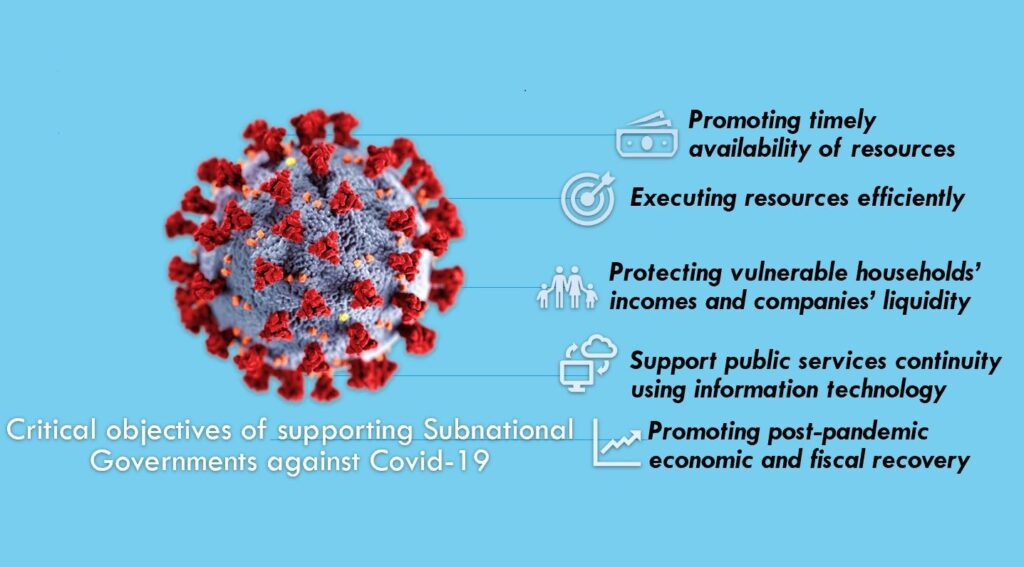Subnational governments (SNGs) in Latin America and the Caribbean (LAC) are on the frontline of the coronavirus pandemic. Their proximity to the population and to its needs and demands gives them a prime opportunity to gain early first-hand knowledge of the crisis’s evolution.
In the region’s large countries, SNGs are directly responsible for the health response[1], managing public hospitals and emergency services. They also have other pandemic-related functions, such as providing basic education, now with the added challenge of converting to distance learning[2].
In all countries SNGs play a key role, helping enforce social isolation measures; providing essential social services to the vulnerable sectors of the population (including shelters and food centers); giving fiscal assistance to taxpayers whose economic activities have been affected by the quarantine; facilitating procedures through exception measures and online support; offering orientation and, when necessary, psychological support to citizens during the pandemic, and many other actions[3]. All these functions make SNGs a key player in the fight against the serious healthcare, economic and social predicament the COVID-19 pandemic is posing to countries in the region.
Coordination is key to face the coronavirus pandemic
In order to provide an effective response to the crisis, adequate coordination among SNGs (e.g., in metropolitan areas) and between SNGs and the central government is of the essence. One single state or community cannot stop the pandemic from spreading, but all SNGs working together in coordination can definitely make a huge difference.
For example, if each state or municipality were to implement their own, separate isolation rules, the resulting people movement patterns could undermine contagion-reduction efforts[4]. While autonomous decision-making is a basic feature of decentralization, in areas where the general wellbeing is at stake coordinated action is preferable. This applies both to pandemic-contention moves and to the upcoming next step: a gradual easing of the quarantine and a restart of economic activity once current social isolation moves succeed in stopping the virus from spreading. Also of use can be the centralization of some decisions in order to generate savings, such as bulk purchase of ventilators and their speedy delivery to where they are most needed.
That said, subnational autonomy allows each local authority to retain the capacity of making a big difference to help contain and defeat the pandemic and provide support to the population.
IDB response to the pandemic and support for SNGs
In LAC, as in the rest of the world, the crisis triggered by the pandemic requires emergency measures to save lives, protect homes, and safeguard jobs. After comprehensive talks with member nations’ governments and technical analysis conducted by its specialists, the IDB Group announced an immediate response to the sanitary emergency, focusing its support in four multi-sector areas[5]. One of these areas is strengthening public policies and fiscal management to support the response to the health and economic crisis caused by COVID-19. Here, the IDB proposes five critical support goals for the SNGs:

- Promoting timely availability of resources. The crisis is generating a strong “scissors effect” on subnational budgets, with rising expenditures and declining revenues – a combination that widens fiscal deficits. All this is taking place in a context where the region’s SNGs and central governments were already in a fiscal situation that is on average weaker than that of the 2008-09 financial crisis.[6] Yet, it is vital for SNGs to have sufficient resources to help alleviate the pandemic and its economic and social impacts. To this end, it is paramount to: (i) prioritize health emergency expenditures, reassigning subnational budgets and ensuring they are aligned with decisions taken at national level; (ii) loosen up subnational fiscal rules (if any) due to the emergency; and (iii) seek central government support through technical assistance, loans, guarantees and additional transfers, with clear and transparent distribution rules. These and other similar steps are all of a temporary nature and a return to a path of fiscal consolidation should be pursued when the pandemic abates.
- Executing resources efficiently. Efficiency in the execution of public resources assigned to the emergency is now more important than ever, be it for healthcare, social isolation enforcement, or crisis-exit management. SNGs are essential to help with the identification, isolation and treatment of infected patients and vulnerable groups. Some of the temporary measures countries are adopting include: (i) creating Emergency Management Committees to plan and coordinate responses among SNGs and with other levels of Government; (ii) making subnational procurement processes more flexible to facilitate comparison of essential products prices, and resorting to online transactions to boost transparency; and (iii) bolstering local supply and logistics chains to ensure supplies availability and public services continuity. Since this can widen the margin of error and undue use of resources, it is crucial to strengthen transparency and public accountability mechanisms.
- Protecting vulnerable households’ incomes and companies’ liquidity. Although countries tend to manage social-transfer and company-liquidity programs centrally, there is much SNGs can do to help protect the most vulnerable households and the firms worst hit by the pandemic, such as: (i) facilitating subnational taxes, fees and public services payment compliance by extending deadlines and introducing installment plans and temporary moratoriums for the worst-affected taxpayers and sectors; (ii) expanding subnational social transfer programs for the most affected populations in coordination with the central government so as to avoid overlaps and improve targeting; (iii) designing alternative mechanisms to support students’ nutrition and food supply programs, protecting the health safety of public and private suppliers; (iv) creating volunteer programs to help retirees cash in their retirement paychecks and shop for goods; and (v) providing food services in disadvantaged areas and provisional housing for the homeless and families living in overcrowded conditions. While this assistance is of the outmost importance, its temporary nature should be borne in mind, and SNGs should devise strategies to terminate it when the emergency is over.
- Support public services continuity using information technology. Social isolation measures force SNGs to adapt in order to continue to provide critical services while minimizing physical contact with citizens. This creates an opportunity to speed up the digitalization of government-public interactions, fostering the use of fast and simple solutions based on free software (plus digital signature), bearing in mind that the adoption of systems to conduct all kinds of procedures online at subnational level is still relatively low. Some of the best practices being adopted by a variety of SNGs around the world include: (i) in the area of transparency, creating websites to centralize all information on the health crisis and on local monitoring of the pandemic; also, the development of digital tools for the government to communicate with citizens, such as chatbots and other applications to send and receive relevant information on the pandemic: (ii) with regard to remote procedures, implementing online services and temporary procedural flexibility, such as documents’ automatic expiration date extension or authorizing elderly people’s adult children to conduct proceedings for them; and (iii) strengthening the technological infrastructure needed for teleworking, including the speedy acquisition of equipment and safe remote access management.
- Promoting post-pandemic economic and fiscal recovery. The coronavirus crisis is taking a big toll on economic activity. Likely scenarios for gradual quarantine relaxation indicate a probable slow recovery. This in turn can have a long-term effect on revenues and fiscal sustainability of SNGs, which will require current resources and investments to jumpstart the economy. This context can provide an opportunity to re-launch fiscal federalism reforms in the region, clarifying expenditure responsibilities among different government levels, strengthening SNGs tax bases, and organizing transfer systems, including compensation, based on objective criteria in those SNGs with lower tax-collection capacity and higher expenditure needs (see IDB document on equalizations transfers). At the same time, in order to return to a path of fiscal sustainability it will be necessary to resume own-revenue mobilization efforts, improve the technical and allocation efficiency of expenditures, and introduce new fiscal responsibility frameworks suited to a post-coronavirus world. In this sense, promoting a subnational digital agenda can be a strategic move to boost efficiency in the supply of services such as telemedicine, distance learning, administrative procedures, government procurement and revenue collection. Finally, it is also crucial to conduct an analysis of the lessons learned from this crisis, so SNGs are better prepared should the pandemic strike again.
In summary, given their functions and their proximity to the population, LAC’s SNGs, in close coordination with central governments, can play a critical role in responding to the COVID-19 crisis. For the IDB Group, both are key players and strategic partners in our quest to provide immediate answers to the health emergency in order to save lives and promote the economic and social welfare of people in our region.
The authors would like to thank the suggestions received from representatives of subnational governments and experts on decentralization of the region.
References
[1] For an analysis on the role of SNGs in the region, see the IDB Subnational Governments and Decentralization Sector Framework Document.
[2] See how Brazil’s states are adapting to provide distance learning and send money to families to make up for missed school meals: https://consed.info/.
[3] For examples of how LAC’s cities are facing the COVID-19 emergency, visit the IDB Cities Network Team’s blog.
[4] Read The Economist article on the U.S.: https://www.economist.com/united-states/2020/04/02/covid-19-and-americas-political-system. The same reasoning applies conceptually at supra-national level, should countries follow World Health Organization’s guidelines in a coordinated fashion; see Alberto Porto’s story.
[5] See IDB Group news release announcing priority support areas for countries affected by COVID-19.
[6] See Blochliger et al (2010) on the effects of the 2008-09 financial crisis on OECD countries’ SNGs budgets.


Leave a Reply